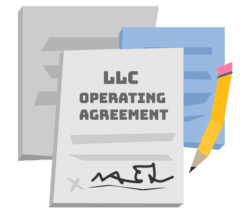How to Start an LLC in Alaska
To set up your Alaska Limited Liability Company (LLC), you need to file Articles of Organization. This costs $250. You’ll also need to get an Alaska Business License ($50) and file your Initial Report (free). So at minimum, it will cost you $300 to start an LLC in Alaska.
Ready to get started? Our step-by-step guide goes through what you need to know to start and maintain an LLC in Alaska.

1. Name Your LLC
Alaska outlines the specifics of choosing your LLC’s name in AK Stat § 10.50.020. Your LLC’s name must:
- include the words Limited Liability Company or an approved abbreviation like LLC
- not suggest your LLC is another kind of business by including words like corp or limited partnership
- not include words that imply the company is a municipality (like city or village)
- be unique among registered businesses in Alaska
Curious on if your name is unique and available? You check your LLC’s name availability through Alaska’s entity name search. You can reserve your LLC name in Alaska for 120 days by filing the Business Name Reservation form and paying the $25 fee. You may renew your reservation twice.
It costs $25 to get a DBA in Alaska. A DBA (doing business as) allows you to use a different name than your legal LLC name. To get a DBA in Alaska, you’ll file the New Business Name Registration form.
Register Your LLC in Alaska Today!


2. Claim Your Domain Name
Your Alaska domain name gives your business more room to grow. From launching a website, building social media profiles, setting up email communications, and printing business cards, getting your domain name opens up your options.
Before choosing your business domain, consider:
-
Does your domain work well with your business name?
-
Is your domain easy to remember and spell?
-
Is your domain available wherever else you want it, like social platforms, trademarks, or business name registries?
Once you have a domain you’re happy with, it’s time to claim it. When you order your domain through Northwest, we’ll also set you up with a website, custom built by our business website experts, hosted and secured through us. You can test drive that website completely free for 90 days.

3. Designate a Registered Agent
A registered agent is someone (individual, company, or yourself) you designate to accept state and legal paperwork on your business’s behalf. LLCs in Alaska are required to have a registered agent.
The duties of a registered agent in Alaska are covered in AK Stat § 10.06.150. They must:
- have a physical address (no P.O. Boxes or virtual offices) in the state
- keep regular business hours
- accept correspondence from the State of Alaska and legal mail on behalf of your business
You will need to list the name and address of your registered agent on your Articles of Organization.
Yes. You can be your own registered agent in Alaska, but keep in mind your name and address will go on the public record. You’ll also have to be available to receive state and legal mail in person by keeping regular business hours. Not something many business owners can do.
You can change your registered agent in Alaska by filing the Statement of Change form for Domestic LLCs and paying a $25 fee.

4. Submit AK LLC Articles of Organization
To officially form your LLC, you’ll need to submit the LLC Articles of Organization to the Alaska Division of Corporations either online, by mail, or in person with a $250 filing fee.
You’ll provide the following information:
- Company name. Include an indicator like LLC.
- Purpose. Briefly describe the activities of the company.
- NAICS code. This code classifies your type of business. Find out your code using the Alaska NAICS Code page.
- Registered agent. This is a person or company designated to accept service of process on behalf of your LLC.
- Management structure. Indicate whether your LLC will be managed by members or managers.
- Optional provisions. Additional arrangements or restrictions you’d like to add go here. For example: LLC duration or restrictions on authority of management.
- Organizer. The name of the person or entity preparing and signing the document.
- Contact name and phone number. If the state has a question about your filing, they will reach out to this person.
Note: All of the information on this form will become part of the public record.
You can submit your Articles online, by mail, or in person.
Mail:
State of Alaska
Corporations Section
P.O. Box 110806
Juneau, AK 99811-0806
In Person:
333 Willoughby AVE, 9th FL
State Office Building
Juneau, AK 99801-1770
Online:
Alaska Online Filing
The total cost to form an LLC in Alaska is $300, including the $250 fee for filing your Articles and the $50 fee for your business license.
To amend your Alaska Articles, file the Articles of Amendment for Domestic LLCs with the Division of Corporations, Business and Professional Licensing. The fee for amending your Alaska Articles of Organization is $25.
The best way to keep your private information off the public record is by not listing it on your LLC articles. The only way to do that is to find a registered agent who will let you use their address in place of your own. We’re that registered agent!

5. Get an Alaska Business License
Alaska requires all LLCs to get an Alaska business license and renew it yearly for the privilege of doing business within the state. If you’re a professional that requires licensing from the state like doctors, accountants, and tobacco sellers, you’ll get your Alaska general business license after getting whatever professional licenses you need.
Nonprofessionals get their business license after filing their Articles with the state and before doing business. It costs $50 to get your business license.
All entities in Alaska must get a general business license, including sole proprietorships, LLCs, and corporations.
You don’t renew your LLC, but you do renew your Alaska business license every year for $50. All business licenses in Alaska expire on December 31, so you’ll need to be sure to renew before then to keep your business in good standing.

6. File an Alaska Initial Report
Within the first six months of filing your Alaska Articles of Organization, you’ll file an initial report. Your initial report gives the state the names and addresses of your LLC’s owners and/or officers. There is no fee for filing your Alaska Initial Report. You can file this report online through Alaska’s online filing system and print out a copy to file by mail or in person.
Next Steps After Creating Your LLC

Write an LLC Operating Agreement
An Alaska operating agreement is an internal document describing the framework for your LLC’s management. It covers all the details of your LLC’s operation—membership duties, powers, responsibilities, and the strategies in place for dealing with things like business dissolution.
A sound operating agreement will define how your business handles big-picture situations. Things like profit allocation and business dissolution are sorted out here to prevent disagreement later. Alaska allows LLC owners to create custom operating agreements, as long as it does not violate any laws or contradict the Articles of Organization.
The state of Alaska doesn’t require LLCs to keep an operating agreement. Regardless, an operating agreement is critical for the good of your company. It’s perhaps one of the most important documents an LLC keeps. It should be in writing and updated regularly.
Yes. Even though you can handle conflict resolution with yourself, an operating agreement does far more than that. It helps you prove your LLC is yours and guards your limited liability.

Get an EIN, Bank Account, & Funding
An EIN, also known as an Employer Identification Number, is comparable to a social security number for your business. It helps the IRS identify you on tax filings and reporting.
You’ll need an EIN to open a business bank account for your LLC. A business bank account not only enhances the separation between your personal and business finances, but it gives a place for you and any other owners to place initial contributions that fund your LLC.
To get an EIN in Alaska, you’ll file an Application for Employer Identification Number (also known as Form SS-4). You can file this form online if you have an SSN or by mail using the paper form if you don’t have a social security number. There is no fee for this form.

File Taxes & Reports
LLCs in Alaska are also subject to some state taxes and need to file a biennial report. Here’s what you need to know:
Taxes
In Alaska, all LLCs will be taxed as a pass-through entity by default. Profits will simply pass through the LLC itself and disperse onto the owners to disclose on their personal tax returns. LLC owners will pay the self-employment tax at the federal rate of 15.3%.
Biennial reports
Alaska Biennial Reports are due every two years by January 2, starting from when you filed your company’s initial report. So if your initial report was filed in an even-numbered year, the biennial report will be due in January of every even-numbered year for the life of your company.
You’ll file your report with the Division of Corporations, Business & Licensing. Filing the biennial report costs $100. If your report is more than a month late, a penalty of $37.50 is added.
When you hire Northwest to form your business or act as your registered agent, we’ll automatically remind you about the report and file it for you.
*This is informational commentary, not advice. This information is intended strictly for informational purposes and does not constitute legal advice or a substitute for legal counsel. This information is not intended to create, nor does your receipt, viewing, or use of it constitute, an attorney-client relationship. More information is available in our Terms of Service.
Ready to Start an LLC in Alaska?






